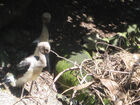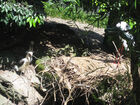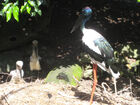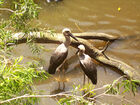
Rainforest Habitat baby storks growing fast
Rainforest Habitat baby storks growing fast
The two baby Jabirus or black necked storks to give them their correct name that were born at the end of October at the Port Douglas Rainforest Habitat are growing at a fantastic rate.
They are now so big that Mum and Dad cannot coax them back into the nest. So Mum and Dad are using the bulky nest as a guard post to keep an eye on their little ones. The two youngsters are now independently feeding for themselves and for now they keep returning to the safety of the shade by the side of their home nest where Mum and Dad proudly stand watch.
Jabby and James currently stand about two thirds the height of their parents and as you can see from the photos we took last week, they are just beginning to get a hint of their adult colourings but it will be a little while yet before they are as beautiful as their parents and even longer than that before they would be fully independent. In the meantime they are attracting good crowds to see them up so close yet in their own environment and if you haven't seen them yet, you really are missing a treat. They are gorgeous.
Editors Notes: I'm sure you want to know all about these two cuties so I dug out a bit of official natural history for you to enjoy: The Black-necked Stork is the only representative of the stork family found in Australia and often referred to as a Jabiru. Adults have a striking black and white plumage, with deep red legs and feet. The females have yellow eyes, while the males have dark eyes.
The Black-necked Stork is found all along the north and east coast of Australia. They inhabit freshwater marshes and wetlands, lakes, pools in open forests, mangroves and large rivers. Each bird hunts independently, striding through the shallow water, probing with its large powerful bill as it goes.
The storks are freshwater foragers where their main food is fish, but they can also eat reptiles, frogs, crabs, rodents and carrion. When hunting active prey a bird will run a few awkward steps and catch the food with a rapid thrust of the bill, swallowing it with a backward jerk of the head.



